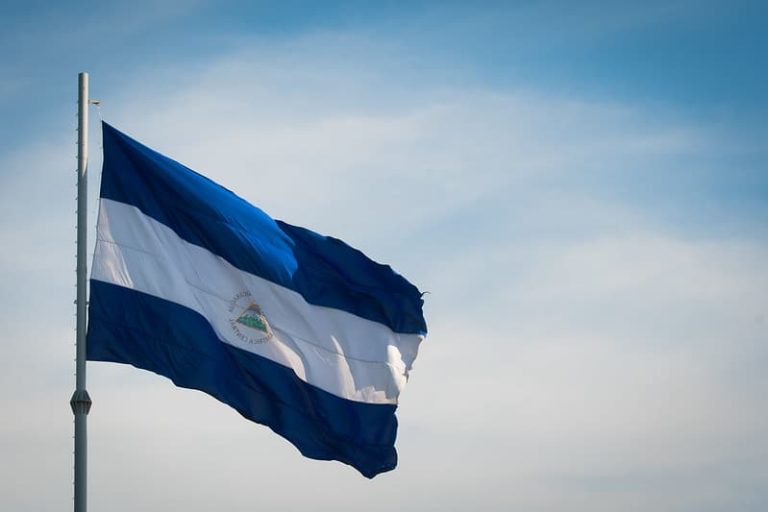21 de julio 2021

The Return of the Military

PUBLICIDAD 1M
PUBLICIDAD 4D
PUBLICIDAD 5D
A solution begins by repudiating the re-election of Ortega, obtaining the release of all political prisoners and a lifting of the police state.

Alternative democratic institutions are powerful mechanisms of civil resistance or nonviolent struggle against repressive regimes
There are less than four months until the November 7 elections, which will take place without any transparency or political competition. The Ortega Murillo dictatorship holds six opposition presidential candidates in prison, those who have the highest favorable opinion and vote intention in the polls, and who were competing to be “the unity candidate of the opposition.”
With the opposition eliminated in advance, with an Electoral Council controlled by the FSLN and without international observation, the question that everyone is asking is not who will win the elections, but what will be the political and economic consequences of the fourth re-election of Daniel Ortega without national and international legitimacy.
How will Ortega govern in 2022 amid a global condemnation, without political or diplomatic recognition, and with the consequent isolation of his government in the multilateral and regional finance organizations (IMF, World Bank, IDB, CABEI), and in the trade alliances with the United States and Europe (CAFTA and EU-CAAA)?
What are the additional economic and social costs that Ortega will impose on Nicaraguan society to prolong his agony in power, and how will the country’s vital forces react to a dictatorial regime without political legitimacy?
Ortega first eliminated all political competitors who could defeat him in a free election. Now he is deciding, with the force of repression and his political discretion, which parties and candidates for the presidency and the National Assembly, can participate in the vote. His objective is to select his political interlocutors in the National Assembly to try to mitigate the legitimacy crisis which will erupt after his inauguration on January 10, 2022.
The position of the international community in the American continent, in Europe, and international organizations, is increasingly clear and forceful regarding the illegitimacy of the results of the November 7 elections. Even with the participation of the opposition Citizen Alliance (CxL), which is determined to register a presidential candidate among “those who remain” to preserve its legal status, there will be no diplomatic recognition for the Ortega Murillo dictatorship and, therefore, by not recognizing the results, the demand to hold new elections will be imposed.
What will be the position of the future minority bench of CxL deputies who will compete for second place with the PLC? What will be the role of the leadership of the private sector and big business, and the role of the moral leadership of the bishops of the Catholic Church?
Will they accommodate the Ortega and Murillo dictatorship, betting that the political solution to the political crisis will come from abroad, or will they invest their political, social, and moral capital to exert civic pressure that will contribute to promote a democratic transition?
Such happened in Peru in 2000, when the dictator Alberto Fujimori was re-elected through electoral fraud, previously denounced by the opposition that abstained from participating. Six months later a political crisis broke out, which led to his departure from power, and his replacement by a transitional government that called for new elections won by Alejandro Toledo. In Nicaragua, the only democratic solution is without Ortega and without Murillo in power.
By burying the November 7 elections, Ortega and Murillo lost their last opportunity to be part of the political solution to the national crisis. By opting for repression, political radicalization, and a new electoral fraud on November 7, Ortega and Murillo also dealt the final blow to a possible democratic transition, which will only be possible after their departure from power to negotiate an electoral reform, with their constitutional successors and call new free elections.
The departure from power of the dictatorial couple resulting from a process of maximum national and international political pressure, represents the greatest challenge for national unity in Nicaragua -including the public sector and the military-, and the international community.
The first step is to repudiate the Government and the National Assembly resulting from the November 7 elections, which should lead to the release of all political prisoners, as well as the suspension of the police state to restore democratic freedoms and allow the return to the country of all the exiles, as Ortega committed himself to do with the Civic Alliance in March 2019 in the second national dialogue, having as witnesses the representatives of the Vatican and the OAS.
The democratic transition in Nicaragua and the call for new elections, will only be possible without Ortega and Murillo.
This article was originally published in Spanish in Confidencial and translated by Havana Times
Archivado como:
PUBLICIDAD 3M
Periodista nicaragüense, exiliado en Costa Rica. Fundador y director de Confidencial y Esta Semana. Miembro del Consejo Rector de la Fundación Gabo. Ha sido Knight Fellow en la Universidad de Stanford (1997-1998) y profesor visitante en la Maestría de Periodismo de la Universidad de Berkeley, California (1998-1999). En mayo 2009, obtuvo el Premio a la Libertad de Expresión en Iberoamérica, de Casa América Cataluña (España). En octubre de 2010 recibió el Premio Maria Moors Cabot de la Escuela de Periodismo de la Universidad de Columbia en Nueva York. En 2021 obtuvo el Premio Ortega y Gasset por su trayectoria periodística.
PUBLICIDAD 3D